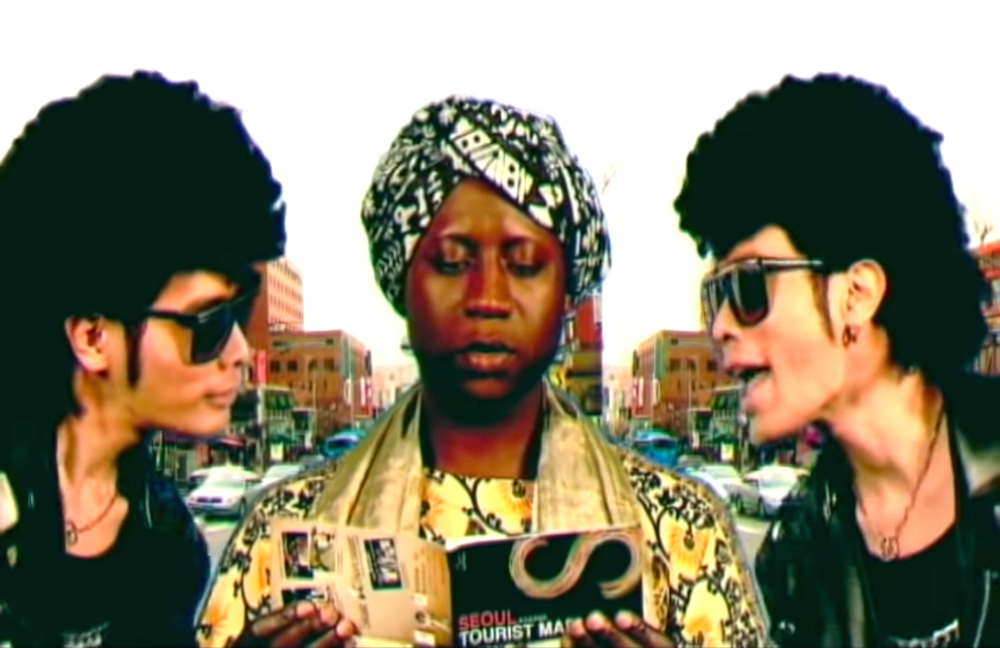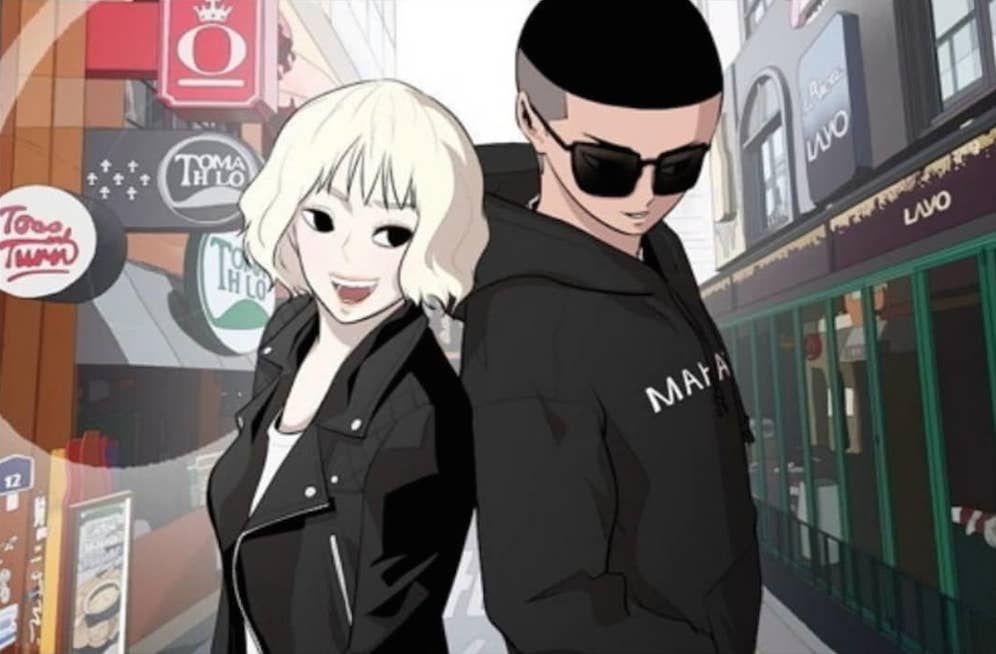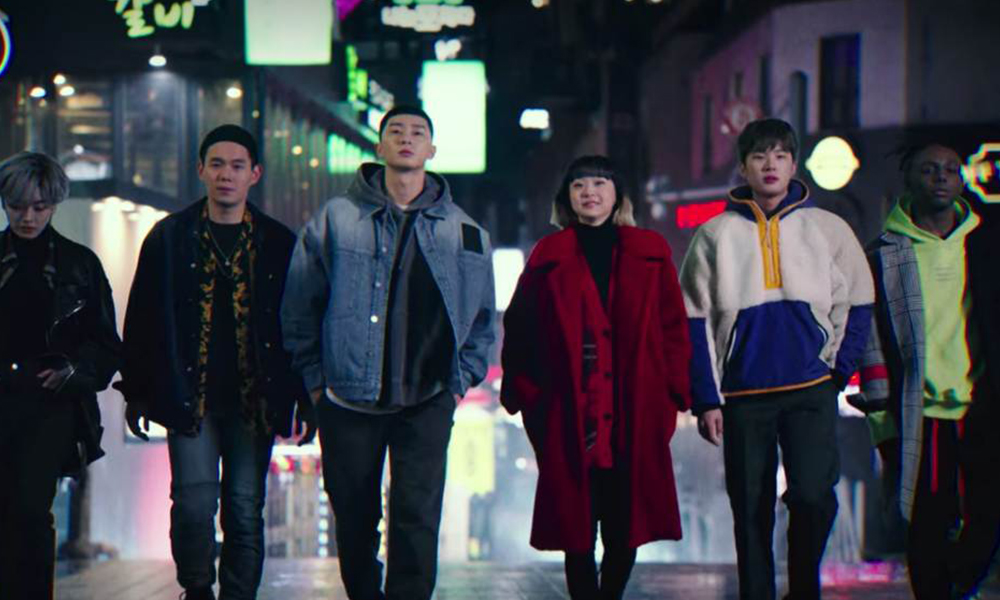They say you can find anything in Itaewon. To find Itaewon itself, you need only head toward the very center of Seoul, right next to the old United States Army base. To orient yourself within Itaewon, you need only know three landmarks: “Hooker Hill,” “Homo Hill,” and “Halal Hill.” Though unlikely to appear on an official map of Seoul, those place names hint at the variety of pleasures on offer in Itaewon and almost nowhere else in Korea, at least not in such high concentrations. Visitors come with desires for exotic cuisine, foreign-language reading material, plus-size clothing, and specific varieties of companionship (paid or otherwise) not easily satisfiable in the rest of the city. Just as one can pass a night in Los Angeles’s Koreatown that feels like a night in Seoul, one can pass a night in Itaewon that feels like a night in Los Angeles — a city that, at its best, offers the world in microcosm.
Young Koreans in search of international good times increasingly find them to Itaewon, which now ranks among Seoul’s top date destinations. (Not long after I first met my girlfriend, who went to college in Canada, we went to Itaewon for a taste of Korea’s most credible poutine.) That may surprise those who know other urban areas that have developed next to US military bases, places where a “date” seldom involves dinner. And indeed, the longer a Westerner has lived in Seoul, the more likely that Westerner is to have vivid memories of Itaewon decadence and depravity (whether or not they’re willing to recall them). As recently as the 1980s, such long-term expatriates have told me, the neighborhood really was majority-foreigner, and most of the Koreans one encountered there after dark were, to varying degrees of legality, on the job. But after September 11, 2001, the curfew the US military imposed on its bases, including Seoul’s Yongsan Garrison, leaving Itaewon’s nocturnal economy with no alternative but to attract a Korean clientele.
Today Yongsan Garrison is gone. After a prolonged relocation process, the US Army has as of last year left Seoul for a new, $11 billion camp in the city of Pyongtaek. It leaves behind in Itaewon the other societally indigestible bloc that has, over the past few decades, come to define the image of Westerners in Seoul: English teachers. To the same degree that Korean students “studying” abroad spend their nights and weekends partying in the Koreatowns of the West, Western college graduates who come to Seoul for easily landed jobs in its English “education” industry spend their nights and weekends partying in Itaewon. They may well also run their errands and even live there, attracted by the ease of the area’s lingua franca, a ragged “global English” spoken not just among Westerners and Koreans but Southeast Asians, Middle Easterners, and denizens hailing from every other region of the world besides.

For this reason I vowed, before moving to Korea, never to live in Itaewon myself. What command of the Korean language I’d gained over years of self-study would surely dissipate after a few months in an enclave of Seoul that has catered for so long to foreigners in general and Americans in particular. How natural it would feel to associate only with other Westerners, dining nightly on pizza and nachos in an ersatz West, complaining ceaselessly about the ways of the host society with which we almost never interact. Even now, when the prospect of going to Itaewon arises, I feel a wave of instinctive resistance: what if I’m taken for one of those Itaewon-locked Westerners, or indeed accidentally become one of them? But now I have a more plausible reason to stay away: though Korea has lately been one of the nations least disrupted by the COVID-19 pandemic, this month has seen a new outbreak, one traced back to the clubs of — as a certain segment of the Korean news media has repeatedly emphasized — Homo Hill.
Just has Halal Hill boasts a full-fledged mosque, Homo Hill offers a variety of establishments that make it live up to its own unofficial title. It even has a street full of bars catering specifically and openly to a transgender clientele, a demographic group whose very existence goes unacknowledged in polite Korean society. Or at least it went unacknowledged until recently, a change signaled in part by the prominence of a transgender character in Itaewon Class (이태원 클라쓰), a hit television drama based on a webtoon by Jo Gwang-jin and internationally distributed by Netflix. Such a creative choice isn’t entirely without precedent on Korean TV. But from the show’s debut earlier this year it also set itself apart in other ways, not least with its title, an announcement of intent to deal with a part of Seoul, and subjects associated with that part of Seoul, that many viewers of mainstream Korean television would prefer to ignore.
Itaewon Class is in many respects a standard “K-drama,” telling an emotionally supercharged story of young people struggling against social rivalry, economic hardship, parental pressure, societal strictures, and corporate power. But its setting is a natural place to gather a band of outsiders starting with its protagonist, a 30-year-old ex-convict who never graduated high school. Marked as different even by his given name, with its three syllables rather than the usual two, Park Sae-ro-yi has no choice but depart from the established Korean paths to success. Imprisoned as a teenager for beating nearly to death the rich kid who killed his father in an auto wreck, Sae-ro-yi obsessively reads and re-reads the memoirs of his enemy’s own father, the founder of a large food conglomerate called Jangga. After his release Sae-ro-yi goes to sea, working for seven years on a deep-sea fishing boat to save up the money to start his own pub. His goal is threefold: to realize his dead father’s dream; to win the hand of Soo-ah, the girl he liked in high school (no fan, by her own admission, of poor boys); and to take down Jangga.

“Have you been to Itaewon before?” Soo-ah asks in a letter to the jailed Sae-ro-yi. “On October 31st every year, people enjoy this festival from the United States here. Apparently they try to comfort the spirits of the dead and ward off evil spirits.” Soo-ah speaks these words over footage of the foreigner-packed streets of Itaewon on Halloween, the very night Sae-ro-yi, having finished his prison sentence, re-enters society by heading straight for Seoul. “Besides this festival, Itaewon is still an attractive place. There are pretty buildings and a variety of people from across the world, which makes you feel like you’re on an overseas trip. And everyone there looks so free.” The supposedly “free” lives lived by Westerners — seen as not subject to the deforming pressures of Korean life, with its many overlapping groups and their expectations — have long been culturally associated with Itaewon.
In 2011 the comedic pop-music duo UV celebrated that association with “Itaewon Freedom,” whose 1980s-style music video features litter-strewn streets and black actors dressed in both native African and U.S. military garb. Thanks to the latest coronavirus outbreak, I’ve heard the song more often in the past few weeks than I have in the past few years. But it now seems to be cued with more than a little irony: yes, Itaewon may offer a taste of the pleasures and dangers of the outside world, but now the latter include exposure to the pandemic from which Korea has offered a comparatively safe haven. “On this small street, you can see the world,” Soo-ah writes of Itaewon’s main drag, and now as before, the country’s often fraught relationship with the outside world is reflected by attitudes toward this part of town that in the span of twenty years turned from Seoul’s Sin City into something more resembling the “Global Fair” section of Everland, Korea’s largest the theme park.
Everland is in Yongin, the southern exurb of Seoul also home to the coronavirus-carrying 29-year-old who came up to Seoul a few weekends ago and carried out an ambitious clubbing plan. Though the “Itaewon spreader” is reported to be Korean, the coronavirus has been treated here as an essentially foreign threat. “Wear your mask,” I heard a mother said to her daughter in Korean at a coffee shop here in Seoul just before this COVID-19 flare-up. “There are still new cases, but they’re all foreigners who’ve entered the country.” At that the daughter scowled in my direction, the kind of behavior that somehow never bothers me, perhaps because part of me enjoys being classed as an outsider. Last weekend I passed by a pub in my neighborhood, out of whose door was emerging a group in their late twenties. “Hey, foreigner, take a picture with us!” shouted a slightly drunk-sounding woman among them, seemingly assuming I didn’t understand Korean. (I admit to some disappointment that she got spooked and begged off the photo when I approached.)
Such an encounter wouldn’t occur in Itaewon, not least because “foreigner” could describe a third of the people out on the street. But when they step out of Itaewon Station, Koreans, too, must feel foreign — like they’re on an overseas trip, as Soo-ah puts it in Itaewon Class. Regardless of national origin, everyone in Itaewon enjoys much the same effective “foreigner” status they would in a polyglot Western metropolis like Los Angeles or Berlin. In some cafés and restaurants of the German capital the national language is never heard, not least because the staff themselves don’t speak it, and a similar syndrome afflicts Itaewon. With foreigners always liable to enter and blithely order in English, Sae-ro-yi hires for his pub Danbam a black waiter named Tony — Tony Kim, it turns out, born to a Korean father and a Guinean mother, fluent in Korean and French but without so much as a word of the “global” tongue. The show takes several such opportunities to poke fun at Korean misperceptions about the wider world, in this case the idée fixe that anyone who doesn’t look Korean not only doesn’t speak Korean, but does speak English.

Danbam’s ragtag crew also includes the aforementioned transgender character, a cook; as waiters, an organized-crime thug with whom Sae-ro-yi shared a jail cell and the illegitimate younger son of Jangga’s CEO; and a young social-media “influencer” who, groomed mercilessly for success by her ruefully striving single mother, turns down her acceptance at a prestigious university to insinuate herself as the pub’s manager. All are deliberately crafted misfits in modern Korean society, and thus natural fits for Itaewon. They certainly seem to belong there more than does the relatively traditional Danbam, with its non-Konglish name (meaning “Sweet Night,” or homophonically “Sweet Chestnut”) and its Korean-only menu of specialties like grilled chicken gizzards. But Itaewon’s famously unforgiving crucible for eateries, with its jaded crowds and often questionable morals, provides just the right challenge for a character like Sae-ro-yi, defined as he is by strict adherence to his principles, including an unbending loyalty to his fellow outsiders.
Longtime Itaewon habitués may take a high-production-value drama like this as a harbinger of the neighborhood’s terminal gentrification. The red-hot center of Seoul has long been cooling as the taboos that once fired it have lost their shock value. Itaewon’s trajectory is mirrored by that of Hong Seok-chon, who plays himself in a few episodes of Itaewon Class. A successful television personality in the 1990s, Hong was forced to start over after coming out as gay in 2000 and losing all his professional engagements in the resulting backlash. At that time, mainstream Korean public opinion encompassed a view of homosexuality as an essentially foreign phenomenon, practiced in the main by promiscuous disease-carriers from the West. That remains the view aired through the megaphones of Seoul’s octogenarian street-corner preachers today, but in less than fifteen years, Hong — still the best-known openly gay celebrity in Korea — regained his prominence and then some. He now owns a suite of Itaewon restaurants and appears not just on television, but on his own line of instant ramen noodles sold in every convenience store.
Just weeks after the end of Itaewon Class, COVID-19 has re-imbued its real-life setting with some of its former risky-business atmosphere. (Korea’s Ministry of the Interior and Safety recently recruited the actor who plays Tony — an American named Chris Lyon, who does indeed speak English — to present a Youtube video demonstrating the approved methods of hand-washing and mask-wearing.) It has also rendered international travel, one of the great Korean enthusiasms of the 21st century, impractical if not impossible, redoubling Itaewon’s value as a portal to the outside world. Whatever dramatic excesses of Korean television drama, they don’t drown out the genuine appreciation of the neighborhood that must have motivated Jo Gwang-jin, creator of the original Itaewon Class web comic, to tell a story there. In highlighting the surprises to be found on the winding streets and well-used rooftops along its slopes, the show has also done something to soften my own position on Itaewon. Let’s face it: when I get a jones for the kind of food I used to eat in, say, Los Angeles’s Little Ethiopia, there’s only one place in Seoul that can satisfy it.
Related Korea Blog posts:
Reading Albert Camus’s The Plague in the Time of the Coronavirus
Fried Chicken’s Central Role in a TV Drama, a Police Comedy, and Korean Culture Itself
Looking for Mexican Food in Seoul (or, the Strange Case of Hoover Taco)
When Korea Expats Podcast (or, the Pleasures and Sorrows of Teaching English)
Korea’s English Fever, or English Cancer?
Based in Seoul, Colin Marshall hosts the Korean-language podcast 콜린의 한국 (Colin’s Korea) and is at work on a book called The Stateless City: a Walk through 21st-Century Los Angeles. You can follow him at his web site, on Twitter @colinmarshall, or on Facebook.


